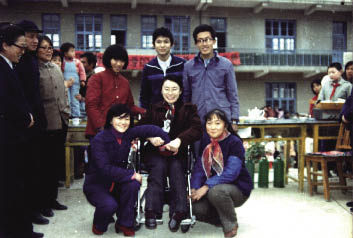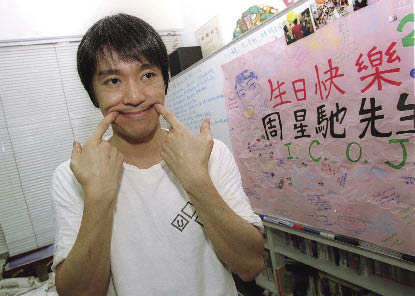|
The canonization of Lei Feng corresponded to the needs of an era defined by class struggle and a planned economy, when absolute obedience and loyalty was preached and embodied by Lei Feng's example.
More has been learnt about Lei Feng and his diary in recent years, and a more human figure has emerged. In addition to upholding the noble ideals of communism, he shared the traits of any young man his age, including secret affection for a girl, and a desire for fashionable gadgets (in his case a wrist watch). Today the Lei Feng Spirit is interpreted more as an awareness of social responsibility, a concept that has slowly grown in China in recent decades.
Official and Unofficial Idols
The decade-long "cultural revolution" provided Chinese people with a surfeit of starkly political art. So when songs by Taiwanese siren Deng Lijun (aka Teresa Tang) leaked into the mainland in the late 1970s, people were immediately mesmerized by her sweet voice and the delicate human sentiments of her words, which mainly focused on love, friendship and the fickleness of life. Given the tensions across the Taiwan Straits at that time, mainlanders had no access to her songs except via taped Taiwanese radio broadcasts. The authorities denounced her songs as obscene and decadent, and did not allow them to be broadcast via official media until 1979. Inspired by Deng Lijun, the first crop of pop singers appeared in China in the 1980s, including Cui Jian, the founder of Chinese rock and roll.
Following many heroes and heroines the authorities had created to promote particular values and ideology, Deng Lijun is remembered as the first "entertainment" star for mainland Chinese. Since then figures in the film, TV, music and sports fields have gained growing popularity across the nation, and wield tremendous influence, particularly among young people.
|

|
| Zhang Haidi with middle school students in Shandong in 1983. Cnsphoto |
Zhang Haidi was another famous woman of the early post-Mao era, though of a different kind. Paralyzed by spinal hemangioma at the age of five, Zhang showed extraordinary determination as she grew up, and kept testing her limits. She studied the educational curriculum from primary school to college by herself, practiced acupuncture for people around her, and wrote an autobiography Dreams from the Wheelchair, which deeply moved her compatriots. In 1983 the authorities called on the nation to follow her example of determination and dedication. Though she was another government-backed heroine, Zhang, with her long free-flowing hair and stylish clothes, was distinguished from earlier official heroes by her distinct femininity.
Zhang Haidi's rise as the nation's new role model reflected China's shift in priorities, from revolution to modernization during the early 80s. The Four Modernizations (modernization of industry, agriculture, national defense, and science and technology) were set as national goals, and the policy of opening-up and reform was launched. In this environment self-achievement was encouraged and respect for learning restored, making Zhang Haidi a person ordinary Chinese could look up to.
Stephen Chow, Iconoclastic Icon
|

|
| Hong Kong comedian Stephen Chow. Cnsphoto |
There was a growing trend in China of embracing unconventionality and underachievement in the 1990s, which found expression in the popularity of films starring Hong Kong comic Stephen Chow. By playing mischievous, cynical and somewhat roguish characters with a core of disguised or undiscovered goodness, Chow created a new genre, Mo Lei Tau (nonsense or no-brainers in Cantonese), which immediately found a large cult following among young Chinese.
Chow first came to fame with his 1995 film A Chinese Odyssey, loosely based on the classic Chinese epic Journey to the West. Much of the dialogue was widely quoted by youths and soon became part of daily banter. In 2001, Chow gave a lively lecture to more than 3,000 excited students at Peking University, long recognized as a birthplace of new thought and culture in China.
As a result of Chow's fame, for the first time in China's entertainment industry actors with humble features and physiques became superstars. This laid the ground for the advent of grassroots heroes in the 21st century.
|
